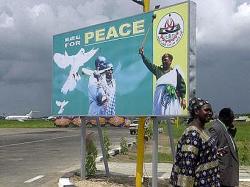Sudan peace to offer hope for economic boom in Africa
NAIROBI, Kenya, Jan 8, 2005 (PANA) — The signing of the peace agreement on
Sunday between the Sudan government and the rebel Sudan Peoples
Liberation Movement/Army (SPLA/M) heralds a new era of peace in
Africa and a period of great economic opportunities.
 For the South African government, peace in Sudan represents an
For the South African government, peace in Sudan represents an
awakening call for the maximisation of economic cooperation
which, according to President Thabo Mbeki, will promote the New
Partnership for Africa’s Development (NEPAD).
Kenyan President Mwai Kibaki, in his New Year’s message, stated
that Kenya’s quest for “better economic transformation” has led
the government to chase new opportunities by fostering the search
for peace in the Sudan.
“It is for this reason my government has devoted a lot of effort
and resources to promote peace and co-operation in our region.
This will create an expanded economic space for our increasing
trade in goods and services as well as investments,” Kibaki
noted.
The search for peace in Sudan, Kibaki said during a UN Security
Council meeting in Nairobi last November, would awaken Africa’s
sleeping economic giant.
As the two parties embroiled in a two-year peace process in
Nairobi to square issues regarding the role of religion and the
state, the equitable distribution of economic resources and the
sharing of political power finally sign the peace accord, African
nations are on the wings to capture various economic cooperation
opportunities.
South African firms, taking note of the massive economic
potentials in the oil rich southern Sudan region, has clinched
two notable deals with the Sudan government for exclusive rights
to explore oil wells in the country.
According to the South African media, South Africa’s National Oil
Company, Petro SA, recently signed an agreement with Sudan’s
State Oil Company, Sudapet, for exclusive rights for Oil Block 14
in Sudan, where exploration would shortly begin.
Mbeki’s recent visit to the country helped to fast-track the
economic cooperation between the two nations, with the South
African foreign ministry saying several South African firms have
economic interests in the vast and natural resource rich Sudan.
Kenyan government officials say the active involvement in Sudan
by the donor community and the rapid start of the reconstruction
activities are crucial ingredients for stability in the delicate
phase following the signing of the peace pact.
“It is expected that the international community will be able to
join with the southern Sudan in the essential task of realising
the long awaited reconstruction of the country’s infrastructure,”
Kenyan Planning and National Development Minister told PANA in an
interview.
Kenya is pursuing a joint rail connectivity programme with the
Southern Sudan, which is expected to radically transform the
region’s infrastructure connectivity as the rail project also
covers the neighbouring Uganda.
The plans for the reconstruction of the 2,500-km Uganda-Kenya-
Southern Sudan railway, a project that has attracted some of the
biggest train manufacturing firms in Europe, is expected to cost
an estimated five billion US dollars.
German Thormaehlen Schweisstechnik Group of companies, a rail
engineering company, is the main investor in the project but the
SPLA/M Commissioner for foreign relations, Castello Garang Ring,
says the SPLA/M has secured a credit line from the German
government to finance the project.
Ring told PANA recently that the SPLA/M negotiated with the
German Treasury for the loan on account of its massive control of
the vast oil resources in the south after the implementation of
the peace accords.
The SPLA/M official said the German government was specific about
the 300 million euro loan for the rail project, saying it would
only be released after the signing of the accord, with the oil as
the guarantee.
South African firms are also eyeing contracts with Sudanese
companies. One of the South African firms, the Global Railway
Engineering Consortium SA, has reportedly clinched a rail
rehabilitation contract with the Sudanese Railway Corporation.
The two companies signed a 9 December agreement worth 21 million
US dollars in which the SA consortium undertakes to rehabilitate
Sudan’s ailing rail system.
SPLA/M leader John Garang told the UN Security Council meeting
that the signing of the comprehensive peace accord “would unlock
the massive natural resources in the Southern Sudan, which had
previously not been exploited because of the war.”
“The Southern Sudan is ready for a paradigm shift in the
political and economic sectors of the country. Peace is what it
means to the people of Southern Sudan. We will work energetically
with all the parties in Sudan to ensure peace,” Garang
told the 18-19 November Council meeting in Nairobi.
With the signing of the final peace accord to end the years of
turmoil, reached after a peace process described by Garang as
“long and torturous,” Sudan is set for a new beginning especially
after an assurance by the US Secretary of State Collin Powell.
Powell said during a meeting with Garang and the Sudanese First
Vice President Ali Osman Taha that the US was ready to help Sudan
get all the international help it needs to rebuild the collapsed
infrastructure.
